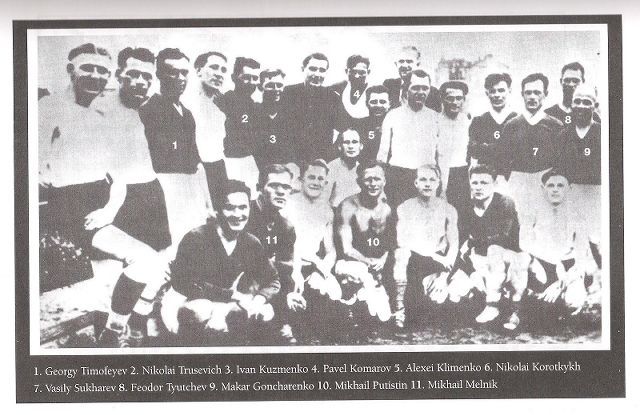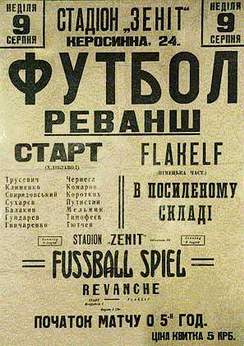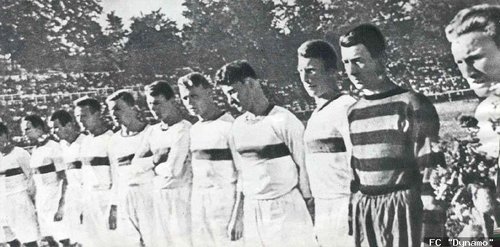Written in 2009 by Emma Anspach, Hilah Almog, and Taylor.
Edited & Updated in 2013 by Brittney Balser and Alessandro Santalbano
***
In hopes of quietly proceeding through their execution and deportation policies, the Nazis welcome football’s revival during their occupation. It was dubbed one of their many methods under the “pacification by normalization” strategy 1. Little did they know, an amalgam of old-footballers-turned-bakers under the epithet FC Start would actively quell Nazi hopes for an obsequious Kiev. This team, as much legend as they are myth, made the mistake of losing against a team bred not to ever do so.
FC Start
The vast majority of Start’s roster consisted of seasoned Dynamo players, such as Alexei Klimenko, the incredibly young but equally ferocious defender, Mikhail Sviridovsky, Fyodor Tyutchev, Mikhail Putistin, the 1936 silver medal veteran, and Nikolai Korotkykh. His forwards were Nikolai Makhinya, Pavel Komarov, Ivan Kuzmenko, the beast who practiced with a football impregnated with two others so he could kick the original one thrice as far, and Makar Goncharenko. The last three came from Lokomotiv, a club team of equal caliber and status. They were Mikhail Melnik, Vladimir Balain and Vasily Sukharev 2 . Barred by the Nazis from the name “Dynamo” (a creation of evil Soviet forces), the players symbolically chose the name Start- whose meaning remains largely the same thing as it does in English 3. It was subtly representative of a new beginning and painstakingly apolitical.
Image: http://esfuerzomaximo.com/wp-content/uploads/2008/07/fc_start.jpg
Unstoppable Start
Little time was to pass before Start became something of a legend. Their Zenit-christening game against Hungary saw them win 6-2. Days later, they would beat the Romanian garrison team at Zenit 11-0. Slowly, Nova Ukrainksi Slovo began coverage of Start’s games. While restricted at best, the press’s acknowledgment secured a consistent fan base at their games and bolstered their growing reputation. As morale began to build with each subsequent Start win, the Germans began imposing admission charges. A hefty five roubles to the impecunious crowds did not stop them from coming- it was their only hope at escape, albeit just an emotional one 4. When Start defeated their first German team, PGS (a military unit), 6-0 the German spirit towards the game began to change 5 .
Start would continue to play another, stronger Hungarian team known as MSG Wal and defeat them 5-1. Complaints ensued that MSG Wal had only ten players due to an injury, and they called for a rematch. Drawing large crowds and more intense competition, the rematch still saw Start away with a 3-2 win 6. Germany was displeased. The team was not only undefeated, but also quickly adhering to their reputation as folk heroes. In response came team Flakelf, the German official Luftwaffe team, assembled with pure and perfect Aryans. The Luftwaffe halo floating above the Flakelf team offered an aura of invincibility, and a personification of purebred superiority. The goal was to rid Kiev of its rallying force without shooting or imprisoning those responsible for it, since that would only result in 11 martyrs. The game between Flakelf and Start occurred on August 6th, 1942, and the latter won a simple game 5-1 7. The loss put Hitler’s philosophy in stark jeopardy. The perfection of the Aryan nation implied superiority in all respects, especially in the physical realm of sport.
Revenge
Inevitably, the capitulation of Flakelf to Start resulted in a harsh and significant blow that the Nazi’s would have to avenge. The rematch was scheduled for Sunday the 9th of August- and signs alerting the masses of the game plagued the city. The leaflets were symbolically printed on the same paper as Nazi official announcements, and below the word “football” read the word “revenge”- of equal size and prominence 8 . In a matter of days, the leisurely addition to the Nazi occupation had transformed from a morale booster to a political agenda.
Image: http://3.bp.blogspot.com/_UKPtjLJJALw/SZwVhbq7h9I/AAAAAAAAAhI/vxKizUrgz6Q/s400/death+match.jpg
Before the match, a man dressed in SS uniform entered Start’s locker room with a precise and famous message. All accounts of this moment highlight his impeccable Russian, most likely to emphasize how clear the Germans intended the message to be. In few words, much was communicated: “ ‘I am the referee of today’s game. I know you are a very good team. Please follow all the rules, do not break any of the rules, and before the game greet your opponents in our fashion’” 9. His point was clear: their referee was an SS officer, they were expected to salute and “Heil Hitler” before the match, and they were expected- not by skill, but by sense- to lose.
The Match
The players decided, despite all logic, that to throw the game was a disgrace to soccer and to Kiev. Once they had come to that decision, they performed wholeheartedly. In response to Flakelf’s “Heil Hitler!” FC Start, pretending to reciprocate, began to raise their arms only to pound them to their chests and yell “FizcultHura!” the Soviet sporting salute and the antithesis of the referee’s request. Having done so, Start understood the referee would not call anything against the Germans. They could not hope to reciprocate the roughhousing on pain of disqualification. Additionally, Flakelf was not simultaneously working 24-hour days, nor were they malnourished, nor weak. It was an unfair match up from whistle to whistle. German aggression was manifest and steadfast; some claim they knocked Trusevich unconscious for several minutes, a considerable advantage as they scored on him a few minutes later. It wasn’t until Kuzmenko scored a goal from a hefty thirty yards out (thanks be to his training ball three times regulation weight) that the game showed any signs of equalizing. From then on, Start’s technical superiority could not be dismantled with aggression and unfairness. Going into the half they were leading 3-1 . In the tense limbo between halves, various visitors to the FC Start locker room (including an SS Officer) warned them of the consequencs of winning. However, the second half unfolded to two more goals on each side when the referee blew the whistle before the 90 minutes had lapsed: 5-3 Start . The possibility for Flakelf to lose by more than two was inconceivable and the discomfort tangible. They players shook hands and left the field 10.
The Aftermath
One fateful day the players were one by one summoned to Kordik’s office, where a Gestapo officer awaited them. Never returning to Bakery No. 3, they were taken to Gestapo headquarters in Korolenko Street. Despite being placed in different cells, they could still communicate via expressions and glances. Torturous interrogations followed in German hopes of the players’ concession as thieves or saboteurs. Not one gave in 11. Nikolai Korotkykh, the Start forward, was devastatingly given away by his sister as a former NKVD officer and was tortured to death by the Gestapo 12 . The rest of the team was sent to Siretz, a death camp feigned as labor camp, two days after Korotkykh’s death. It was a death sentence, and ultimately resulted in the infamous term Death Match, of which nearly every Ukrainian is aware. On February 24th, 1943, it was decided that every third prisoner was to be shot at Siretz. This fate befell the no-longer-burly Kuzmenko, the baby Klimenko and the fatherly Trusevich, who died in his goalie jersey. Goncharenko and Sviridovsky escaped. The fates of the others are unknown and the rest is, as they say, history 13.
Image: http://br.oleole.com/media/main/images/blogs/images/group1/subgrp22/trusevichnofcstart_276587.jpg
Main Pages:
Football and Politics in Europe
Hitler, Nazi Philosophy and Sport
Sub-Pages:
How to cite this article: “Football and Politics in Europe, 1930s-1950s” Written by Emma Anspach, Hilah Almog, and Taylor (2009), Edited and Updated by Brittney Balser and Alessandro Santalbano (2013), Soccer Politics Pages, Soccer Politics Blog, Duke University, http://sites.duke.edu/wcwp (accessed on (date)).
- Dougan, Andy. Dynamo Defending the Honour of Kiev. London: 4th Estate, Limited, 2001. Print. ↩
- Dougan, Andy. 130-133 ↩
- Riordan, James. “The Match of Death: Kiev, 9 August 1942.” Soccer and Society 4.1 (2003): 87-93. Print ↩
- Dougan, 138-144 ↩
- Lee, Johnny K. “Playing for Life: Survival Soccer in 1942.” Soccer and Society 7.4 (2006): 486-93. Print. ↩
- Lee 488 ↩
- Dougan 153 ↩
- Dougan 156 & “Match of Death | Legendary ‘Game of Death’ Football Match in Kiev.” Kiev Life | Kiev Travel Guide | Kiev Apartments Hotels Bars Restaurants and Map | Euro 2012 in Kyiv Ukraine. Web. 12 Oct. 2009. <http://www.kiev-life.com/kyiv/match-of-death>. ↩
- Dougan 164, Lee 489, Kiev-Life ↩
- Riordan 89, Dougan 170, 174-179, , Lee 488-489, Kiev-Life ↩
- Dougan 186, Riordan 89-90. Lee 489-490, Kiev-Life ↩
- Lee 490, Dougan 187-8 ↩
- Dougan 186, Riordan 89-90. Lee 489-490, Kiev-Life ↩




Where can I get a copy of the movie?? My son is doing a project on this for school.
Thank you.
Pingback: » The ultimate grudge match
A story unlike many others…profoundly tragic and terribly inspirational.
Pingback: the nazi’s and their football | wrong side of the pond